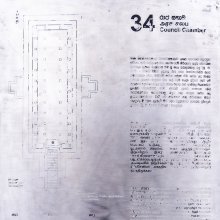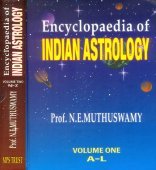Sabha, Sabhā, Sābha: 21 definitions
Introduction:
Sabha means something in Hinduism, Sanskrit, Buddhism, Pali, the history of ancient India, Marathi, Jainism, Prakrit, Hindi. If you want to know the exact meaning, history, etymology or English translation of this term then check out the descriptions on this page. Add your comment or reference to a book if you want to contribute to this summary article.
Images (photo gallery)
In Hinduism
Natyashastra (theatrics and dramaturgy)
Source: archive.org: The mirror of gesture (abhinaya-darpana)The Audience (sabhā)—The Audience shines like the Wishing-tree, when the Vedas are its branches, scriptures of art and science (śāstras) its flowers, and learned men the bees; where men of truth are found, shining with good qualities, famous for righteous conduct, honoured by kings, adorned by the Vedas; where the Vedanta is expounded; when distinguished by the sound of voice and lute (vīṇā) ; possessing heroes of renown, ornamented by resplendent princes, shining with royal splendour.
The Seven Limbs of the Audience are
- men of learning,
- poets,
- elders,
- singers,
- buffoons,
- those who are familiar with history,
- and those who are familiar with mythology.

Natyashastra (नाट्यशास्त्र, nāṭyaśāstra) refers to both the ancient Indian tradition (shastra) of performing arts, (natya—theatrics, drama, dance, music), as well as the name of a Sanskrit work dealing with these subjects. It also teaches the rules for composing Dramatic plays (nataka), construction and performance of Theater, and Poetic works (kavya).
Purana and Itihasa (epic history)
Source: archive.org: Shiva Purana - English TranslationSabhā (सभा) refers to the “council-chamber”, according to the Śivapurāṇa 2.2.28. Accordingly as Brahmā narrated to Nārada:—“[...] making her maiden-in-chief Vijayā wait there, Satī immediately went near Śiva. She saw Him in the middle of the council-chamber (sabhā-madhya) surrounded by hosts of his attendants—Nandin and others of great valour”.
Source: Cologne Digital Sanskrit Dictionaries: The Purana IndexSabhā (सभा).—A Durbar; of the king,1 a description of Sagara's assembly; composed of Brahmans, Kṣatriyas, Paurajānapada, relatives and friends;2 of Kṛṣṇa where there were readings of sacred texts and the Purāṇas;3 public halls of Tripuram;4 of Maya; respective seats for members; the address of the chief;5 of Indra;6 of Tāraka; servants with canes illtreated the devas where the seasons served him as also Siddhas, Kinnaras and Gandharvas the latter by music;7 of Hiraṇyakaśipu; here were all trees plants and birds, animals, Apsaras and other ladies, Asuras of distinction full of splendour and wealth, the equal of which has neither been heard of nor seen.8
- 1) Brahmāṇḍa-purāṇa II. 25. 101: Vāyu-purāṇa 30. 279; 54. 105; 96. 92.
- 2) Brahmāṇḍa-purāṇa III. 49. 31; 50. 16, 17-20: 54. 24: 55. 20.
- 3) Matsya-purāṇa 69. 10-11.
- 4) Ib. 130. 5.
- 5) Ib. 131. 20f.
- 6) Ib. 148. 61: Vāyu-purāṇa 1. 92.
- 7) Matsya-purāṇa 154. 39.
- 8) Ib. 161. 38-89.

The Purana (पुराण, purāṇas) refers to Sanskrit literature preserving ancient India’s vast cultural history, including historical legends, religious ceremonies, various arts and sciences. The eighteen mahapuranas total over 400,000 shlokas (metrical couplets) and date to at least several centuries BCE.
Arthashastra (politics and welfare)
Source: Shodhganga: Kakati Ganapatideva and his times (artha)Sabhā (सभा, “legal court”).—For the disposal of disputes the law books on Rājanīti such as the Rājanīti-ratnākara prescribes four types of sabhās or legal courts viz., Pratiṣṭita and Apratiṣṭita.

Arthashastra (अर्थशास्त्र, arthaśāstra) literature concerns itself with the teachings (shastra) of economic prosperity (artha) statecraft, politics and military tactics. The term arthashastra refers to both the name of these scientific teachings, as well as the name of a Sanskrit work included in such literature. This book was written (3rd century BCE) by by Kautilya, who flourished in the 4th century BCE.
Vastushastra (architecture)
Source: OpenEdition books: Architectural terms contained in Ajitāgama and RauravāgamaSabhā (सभा) refers to “type of building with five levels of elevation §§ 3.12, 29, 35; 4.1, 38.”.—(For paragraphs cf. Les enseignements architecturaux de l'Ajitāgama et du Rauravāgama by Bruno Dagens)

Vastushastra (वास्तुशास्त्र, vāstuśāstra) refers to the ancient Indian science (shastra) of architecture (vastu), dealing with topics such architecture, sculpture, town-building, fort building and various other constructions. Vastu also deals with the philosophy of the architectural relation with the cosmic universe.
General definition (in Hinduism)
Source: archive.org: Vedic index of Names and SubjectsSabhā (सभा) is the name of an ‘assembly’ of the Vedic Indians as well as of the ‘hall’ where they met in assembly. It is often mentioned in the Rigveda and later, but its exact character is not certain. The hall was clearly used for dicing, presumably when the assembly was not transacting public business: a dicer is called sabhā-sthāṇu, ‘pillar of the assembly hall’, doubtless because of his constant presence there.
India history and geography
Source: Cologne Digital Sanskrit Dictionaries: Indian Epigraphical GlossarySabhā.—(SII 2; SITI; ASLV), same as mahāsabhā; the body of the Mahājanas; the assembly of a Brāhmaṇa village of the Tamil-speaking area, such an assembly of a non-Brāhmaṇa village being called ūr; local assembly of a Brāhmaṇa village; same as Tamil kuṟi. (EI 22), the Buddhist saṅgha. Note: sabhā is defined in the “Indian epigraphical glossary” as it can be found on ancient inscriptions commonly written in Sanskrit, Prakrit or Dravidian languages.
Source: Yale Journal of Music & Religion: Ritual Music in Contemporary Brahmanical Tantric Temples of KeralaSābha (साभ) refers to “temple corporations”.—Society in Kerala during the Cēra dynasty (ninth–twelfth centuries) was organized as a pyramid, and at the apex of the feudal hierarchy was the king of the so-called second Cēra dynasty. Brahmans occupied the next-highest position. They were not a single group. Those who were landlords and members of the temple corporations (sābha) were the most powerful and enjoyed the highest economic and ritual position. They were custodians of the temple wealth and Vedic priests.

The history of India traces the identification of countries, villages, towns and other regions of India, as well as mythology, zoology, royal dynasties, rulers, tribes, local festivities and traditions and regional languages. Ancient India enjoyed religious freedom and encourages the path of Dharma, a concept common to Buddhism, Hinduism, and Jainism.
Languages of India and abroad
Pali-English dictionary
Source: Sutta: The Pali Text Society's Pali-English DictionarySabhā, (f.) (Vedic sabhā, cp. K. Z. IV. 370) 1. a hall, assemblyroom D. II, 274; A. I, 143; S. I, 176; J. I, 119; 157, 204. ‹-› 2. a public rest-house, hostelry J. I, 302. dhamma° chapel J. VI, 333.
—gata=sabhaggata S. V, 394; M. I, 286. (Page 681)

Pali is the language of the Tipiṭaka, which is the sacred canon of Theravāda Buddhism and contains much of the Buddha’s speech. Closeley related to Sanskrit, both languages are used interchangeably between religions.
Marathi-English dictionary
Source: DDSA: The Molesworth Marathi and English Dictionarysabhā (सभा).—f (S) A place in which noble or learned persons assemble;--a hall of audience, a councilchamber, an assembly-room, a hall, a cabinet, a court. 2 An assembly, a meeting, a company. sabhā jiṅkaṇēṃ To overcome an opponent in a public disputation or in a suit; to gain one's cause.
Source: DDSA: The Aryabhusan school dictionary, Marathi-Englishsabhā (सभा).—f An assembly-room. An assembly, a meeting.
--- OR ---
sabhā (सभा) [-pāṇḍitya, -पांडित्य].—n Showy and superficial erudition.
Marathi is an Indo-European language having over 70 million native speakers people in (predominantly) Maharashtra India. Marathi, like many other Indo-Aryan languages, evolved from early forms of Prakrit, which itself is a subset of Sanskrit, one of the most ancient languages of the world.
Sanskrit dictionary
Source: DDSA: The practical Sanskrit-English dictionarySabhā (सभा).—[saha bhānti abhīṣṭaniścayārthamekatra yatra gṛhe Tv.]
1) An assembly, a council, conclave; पण्डितसभां कारितवान् (paṇḍitasabhāṃ kāritavān) Pañcatantra (Bombay) 1; न सा सभा यत्र न सन्ति वृद्धाः (na sā sabhā yatra na santi vṛddhāḥ) H.1.
2) Company, society, meeting, large number.
3) Council chamber or hall; ततः सभां करिष्यामि पाण्डवस्य यशस्विनीम् (tataḥ sabhāṃ kariṣyāmi pāṇḍavasya yaśasvinīm) Mahābhārata (Bombay) 2.3.4;12.47.7.
4) A court of justice.
5) A public audience (modern levee.)
6) A gambling-house.
7) Any room or place much frequented.
8) A house for lodging travellers (dharmaśālā).
9) An eating house.
Source: Cologne Digital Sanskrit Dictionaries: Shabda-Sagara Sanskrit-English DictionarySabhā (सभा).—f.
(-bhā) 1. A house. 2. An assembly. a meeting. 3. A Court of Justice. 4. A gambling-house. 5. A much frequented place. E. sa for saha together, bhā to shine, affs. aṅ and ṭāp .
Source: Cologne Digital Sanskrit Dictionaries: Benfey Sanskrit-English DictionarySabhā (सभा).—f. 1. An assembly, [Mānavadharmaśāstra] 8, 11; council, [Rāmāyaṇa] 2, 63, 36, Seramp 2. A much frequented place, [Mānavadharmaśāstra] 9, 264. 3. A court of justice, [Mānavadharmaśāstra] 8, 12; [Pañcatantra] iii. [distich] 109. 4. A house. 5. A palace, [Johnson's Selections from the Mahābhārata.] 94, 57; [Rājataraṅgiṇī] 5, 391.
Source: Cologne Digital Sanskrit Dictionaries: Cappeller Sanskrit-English DictionarySabhā (सभा).—[feminine] house or hall for public meetings, [especially] gambling-house, council-chamber, court of justice, court or palace of a prince; place of refuge, asylum; assembly, society, [especially] good society.
--- OR ---
Sabhā (सभा).—shine out, become manifest, arise, appear as ([nominative] ±iva or yathā). — Cf. ābhāta, nirbhāta, prabhāta, vibhāta.
Sabhā is a Sanskrit compound consisting of the terms sa and bhā (भा).
Source: Cologne Digital Sanskrit Dictionaries: Monier-Williams Sanskrit-English Dictionary1) Sabha (सभ):—See sabhā below.
2) Sabhā (सभा):—f. (of unknown derivation, but probably to be connected with 7. sa; ifc. also sabha, n.; cf. [Pāṇini 2-4. 23 etc.], and eka-sabha) an assembly, congregation, meeting, council, public audience, [Ṛg-veda] etc. etc.
3) social party, society, good society (See [compound])
4) Society (personified as a daughter of Prajāpati), [Atharva-veda]
5) a place for public meetings, large assembly-room or hall, palace, court of a king or of justice, council-chamber, gambling-house etc., [ib.]
6) a house for lodging and accommodating travellers, [Manu-smṛti; Mahābhārata]; etc.; an eating-house (See mahā-s).
7) cf.[Gothic] sibja; [German] sippa, Sippe; [Anglo-Saxon] sibb; [English] god-sib, gossip.
Source: Cologne Digital Sanskrit Dictionaries: Yates Sanskrit-English DictionarySabhā (सभा):—(bhā) 1. f. A house; an assembly.
Source: DDSA: Paia-sadda-mahannavo; a comprehensive Prakrit Hindi dictionary (S)Sabhā (सभा) in the Sanskrit language is related to the Prakrit words: Sabhā, Sahā.
[Sanskrit to German]
Sanskrit, also spelled संस्कृतम् (saṃskṛtam), is an ancient language of India commonly seen as the grandmother of the Indo-European language family (even English!). Closely allied with Prakrit and Pali, Sanskrit is more exhaustive in both grammar and terms and has the most extensive collection of literature in the world, greatly surpassing its sister-languages Greek and Latin.
Hindi dictionary
Source: DDSA: A practical Hindi-English dictionarySabhā (सभा):—(nf) an assembly, association; a meeting; society; -[kakṣa] meeting room, committee room; ~[gāra/gṛha] an assembly hall, chamber; -[tyāga] walkout; ~[pati] chairman; ~[patitva] chairmanship; •[meṃ] under the chairmanship (of); -[bhavana] auditorium, assembly hall; ~मंडपa pavilion; -[maṃca] platform, dais; ~[sada] member of an assembly; —[joḍanā] (derisively) to gather a crowd.
...
Prakrit-English dictionary
Source: DDSA: Paia-sadda-mahannavo; a comprehensive Prakrit Hindi dictionarySabhā (सभा) in the Prakrit language is related to the Sanskrit word: Sabhā.
Prakrit is an ancient language closely associated with both Pali and Sanskrit. Jain literature is often composed in this language or sub-dialects, such as the Agamas and their commentaries which are written in Ardhamagadhi and Maharashtri Prakrit. The earliest extant texts can be dated to as early as the 4th century BCE although core portions might be older.
See also (Relevant definitions)
Partial matches: Bha, Sha, Ca.
Starts with (+155): Sabha-kaksha, Sabha-madhyama, Sabha-nayaka, Sabha-viniyoga, Sabhabharana, Sabhabhavana, Sabhabhiru, Sabhabhiti, Sabhabhushana, Sabhacandra, Sabhacara, Sabhacaturya, Sabhachara, Sabhada, Sabhadhairya, Sabhadhaurttya, Sabhadhikari, Sabhadhita, Sabhadhurtta, Sabhadhyaksha.
Ends with (+135): Ajarshabha, Akshabha, Amasabha, Amatya-sabha, Anaranyasabha, Anathasabha, Ancala-sabha, Anjanavasabha, Anjashta-sabha, Anrishabha, Aranyasabha, Arshabha, Asabha, Ashvakshabha, Atyrishabha, Avasabha, Ayaga-sabha, Bharadari-sabha, Bharatarshabha, Bharatshabha.
Full-text (+1022): Yamasabha, Strisabha, Ishvarasabha, Dasisabha, Inasabha, Rajasabha, Dharmasabha, Sabhocita, Shishtasabha, Pishacasabha, Ekasabha, Sabhasad, Rakshahsabha, Sabhika, Sabhavashakara, Prasabham, Sabhastara, Devasabha, Sabhapati, Asabha.
Relevant text
Search found 100 books and stories containing Sabha, Sabhā, Sa-bha, Sābha, Sa-bhā; (plurals include: Sabhas, Sabhās, bhas, Sābhas, bhās). You can also click to the full overview containing English textual excerpts. Below are direct links for the most relevant articles:
Vastu-shastra (4): Palace Architecture (by D. N. Shukla)
Chapter 2a - Accessory Structures: Sabhā (pillared hall architecture)
Chapter 4 - State or Public Buildings (The cognate structures)
Temples of Munnur (Historical Study) (by R. Muthuraman)
Sabha (assembly of the Brahmin village) < [Chapter 7]
Chathurvedi-mangalam and its administration < [Chapter 2]
Nataraja sabha < [Chapter 4]
Garga Samhita (English) (by Danavir Goswami)
Verse 3.6.12 < [Chapter 6 - The Test of Śrī Kṛṣṇa]
Verse 4.14.14 < [Chapter 14 - The Story of the Jālandharīs]
Verse 1.10.3 < [Chapter 10 - Description of the Birth of Lord Balarāma]
Manusmriti with the Commentary of Medhatithi (by Ganganatha Jha)
Verse 8.11 < [Section III - Constitution of the Court of Justice (continued)]
Verse 8.12 < [Section III - Constitution of the Court of Justice (continued)]
Verse 8.95 < [Section XII - Exhortation and Examination of Witnesses]
Sanskrit sources of Kerala history (by Suma Parappattoli)
The Sucindram inscription of Martandavarma (Dated Kollam 586) < [Chapter 1 - Historical details from Sanskrit Inscriptions]
The Cidambaram inscription of Jatavarman Sundara Pandya < [Chapter 1 - Historical details from Sanskrit Inscriptions]
2. Balamartandavijaya by Devaraja-suri < [Chapter 5 - Sanskrit Dramas and Campus bearing on Kerala History]
Samarangana-sutradhara (Summary) (by D. N. Shukla)
Related products





